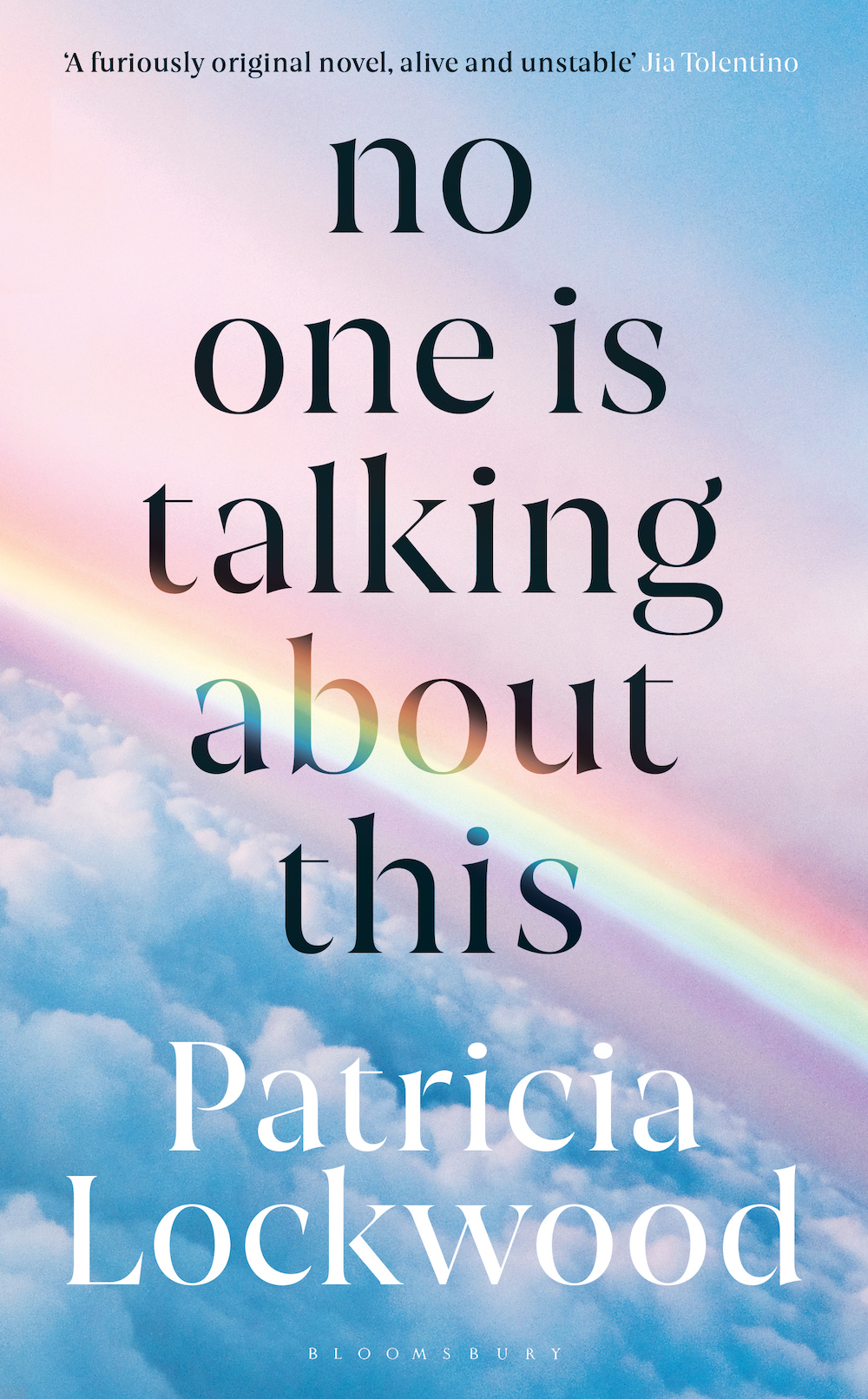Patricia Lockwood: No One is Talking About This review - first novel goes beyond the internet | reviews, news & interviews
Patricia Lockwood: No One is Talking About This review - first novel goes beyond the internet
Patricia Lockwood: No One is Talking About This review - first novel goes beyond the internet
You have a new memory: escaping the pull of the portal

This is a novel, says Patricia Lockwood in her Twitter feed, about being very inside the internet and then being very outside of it.
I started to think about the other lost things that no one talks about now: Compuserve, Netscape, Altavista, Ask Jeeves, all those pre-Google search engines, and the world before the iPhone, when the idea of looking up the name of an actor you’d forgotten as you walked around was the stuff of dreams. But the novel is, thankfully, about more than the vicissitudes of the online world.
It’s also a very different animal stylistically from her highly acclaimed, comic memoir Priestdaddy, which is at times dense and overcrowded. This, Lockwood’s first novel, starts out as a series of fragmented, short bursts of clever observations. “Why were we all writing like this now? Because a new kind of connection had to be made, and blink, synapse, little space-between was the only way to make it. Or because, and this was more frightening, it was the way the portal wrote.”
 The first pages of No One is Talking About This started out as a London Review of Books lecture called “The Communal Mind” at the British Museum almost exactly two years ago. It was then reproduced in the paper. Lockwood, who is also the author of two volumes of poetry (her autobiographical poem Rape Joke went viral in 2013) and a Twitter sensation (her tweet “@paris review So is paris any good or not” was chosen twice by the Atlantic as one of the best tweets of all time) has written several brilliant, funny essays in, among other places, the LRB, where she is on the editorial board.
The first pages of No One is Talking About This started out as a London Review of Books lecture called “The Communal Mind” at the British Museum almost exactly two years ago. It was then reproduced in the paper. Lockwood, who is also the author of two volumes of poetry (her autobiographical poem Rape Joke went viral in 2013) and a Twitter sensation (her tweet “@paris review So is paris any good or not” was chosen twice by the Atlantic as one of the best tweets of all time) has written several brilliant, funny essays in, among other places, the LRB, where she is on the editorial board.
“Her author photos have a marvellously far-seeing and other-worldly look, as if she’s watching two dragons mate through a hole in the clouds,” she writes of Edna O’Brien when reviewing Girl in the LRB. In July she wrote a mesmerising diary in the paper about getting coronavirus and its after-effects: delirium, delusions and forgetting how to read, as well as other more lasting symptoms, such as feeling that “my vision was a picture that had been pasted in front of my eyes”: a variation, perhaps, on the feeling of having her thoughts dictated by the internet, which she describes in "The Communal Mind".
Twitter “told us, each time we opened it, exactly what was happening now”, but a novel in its image isn’t an immediately attractive or even logical proposition – just because people spend a lot of time online, does it mean they want to read a book about an unnamed woman, an internet star famous for a post that said “Can a dog be twins?” written blink-synapse-scrolling style? Mightn’t it be more relaxing to sit down to slow, long paragraphs and a linear narrative? Do we need to be reminded of the fact that “it was the portal that had allowed the dictator to rise to power?” and that “already when people are writing about it, they’re getting it all wrong”?
But as time goes on, the jittery format ceases to grate and appreciation grows for such comments as “The future of information must be about search, while the future of ignorance must be about the inability to evaluate information. But when she looked at the smoking landscape of fathers laid out by cable news, it seemed no longer a question of intelligence or ignorance, but infection.”
And characters come into focus: the narrator’s husband, who’s not addicted to the internet and who sometimes has to help her out of the Twittersphere, remarking that she has a totally dead look on her face; her father, who is a right-wing, anti-abortion, red-faced policeman, with some similarities to Lockwood’s eccentric real-life dad, immortalised in Priestdaddy; her brother, who answers, when she asks him what it’s like to have a child right now, answers, “Oh, it’s great. Everything’s on fire, so you no longer have to worry about doing a good job.”
And her sister, five years younger than the narrator, also familiar from Priestdaddy, who came of age in the 2000s, “during the heyday of thongs and cocaine… when everything got a little chihuahua and started starring in its own show”, is pregnant. Which brings us to the second half of the book, when everything changes.
“Look how big her head is lol,” texts the sister, enclosing a picture of the 20-week ultrasound. A few weeks later, her mother texts her: “Something has gone wrong.” She flies back to her family in Ohio, where abortion is illegal and, under new legislation, it is a felony to induce a woman before 37 weeks, “no matter what had gone wrong, no matter how big her baby’s head was.”
This, in fact, is what no one is talking about: the baby’s rare genetic overgrowth disorder, Proteus syndrome, the first case to be diagnosed in utero. The “shining difference” of the baby is not represented in the portal, no one is posting about it. And no one is talking about the terrible lack of state support on offer either. “Was the baby American? If she was, was it because this was the dust that had raised her particles…or was it because this was the country that had so steadfastly refused to care for her?”
This family tragedy is drawn from Lockwood’s own life, and the time she spends with her sister and the baby, who, against the odds, lives for six months, is beautifully and movingly described. She feels overwhelming love for the child, sees her reflected in clouds and rainbows but also anticipates her phone announcing, in a year’s time, that she has a new memory, that of the baby’s death.
Her internet-addiction is – for a while at least – halted; her thoughts no longer feel is if someone else is writing them. “She tried to reenter the portal completely, but inside it everyone was having an enormous argument about whether they had ever thought the n-word... and she backed out again without a sound.” Lockwood has found a way to talk in her funny, sharply distinctive voice about what matters – “life and death and what comes after” – with delicacy and sadness, and the novel becomes a meditation on grief, time, consciousness, love and “the broad electric stream of things”.
- No One is Talking About This by Patricia Lockwood (Bloomsbury Circus, £14.99)
- Read more book reviews on theartsdesk
The future of Arts Journalism
You can stop theartsdesk.com closing!
We urgently need financing to survive. Our fundraising drive has thus far raised £49,000 but we need to reach £100,000 or we will be forced to close. Please contribute here: https://gofund.me/c3f6033d
And if you can forward this information to anyone who might assist, we’d be grateful.

Subscribe to theartsdesk.com
Thank you for continuing to read our work on theartsdesk.com. For unlimited access to every article in its entirety, including our archive of more than 15,000 pieces, we're asking for £5 per month or £40 per year. We feel it's a very good deal, and hope you do too.
To take a subscription now simply click here.
And if you're looking for that extra gift for a friend or family member, why not treat them to a theartsdesk.com gift subscription?
more Books
 'We are bowled over!' Thank you for your messages of love and support
Much-appreciated words of commendation from readers and the cultural community
'We are bowled over!' Thank you for your messages of love and support
Much-appreciated words of commendation from readers and the cultural community
 Thomas Pynchon - Shadow Ticket review - pulp diction
Thomas Pynchon's latest (and possibly last) book is fun - for a while
Thomas Pynchon - Shadow Ticket review - pulp diction
Thomas Pynchon's latest (and possibly last) book is fun - for a while
 Justin Lewis: Into the Groove review - fun and fact-filled trip through Eighties pop
Month by month journey through a decade gives insights into ordinary people’s lives
Justin Lewis: Into the Groove review - fun and fact-filled trip through Eighties pop
Month by month journey through a decade gives insights into ordinary people’s lives
 Joanna Pocock: Greyhound review - on the road again
A writer retraces her steps to furrow a deeper path through modern America
Joanna Pocock: Greyhound review - on the road again
A writer retraces her steps to furrow a deeper path through modern America
 Mark Hussey: Mrs Dalloway - Biography of a Novel review - echoes across crises
On the centenary of the work's publication an insightful book shows its prescience
Mark Hussey: Mrs Dalloway - Biography of a Novel review - echoes across crises
On the centenary of the work's publication an insightful book shows its prescience
 Frances Wilson: Electric Spark - The Enigma of Muriel Spark review - the matter of fact
Frances Wilson employs her full artistic power to keep pace with Spark’s fantastic and fugitive life
Frances Wilson: Electric Spark - The Enigma of Muriel Spark review - the matter of fact
Frances Wilson employs her full artistic power to keep pace with Spark’s fantastic and fugitive life
 Elizabeth Alker: Everything We Do is Music review - Prokofiev goes pop
A compelling journey into a surprising musical kinship
Elizabeth Alker: Everything We Do is Music review - Prokofiev goes pop
A compelling journey into a surprising musical kinship
 Natalia Ginzburg: The City and the House review - a dying art
Dick Davis renders this analogue love-letter in polyphonic English
Natalia Ginzburg: The City and the House review - a dying art
Dick Davis renders this analogue love-letter in polyphonic English
 Tom Raworth: Cancer review - truthfulness
A 'lost' book reconfirms Raworth’s legacy as one of the great lyric poets
Tom Raworth: Cancer review - truthfulness
A 'lost' book reconfirms Raworth’s legacy as one of the great lyric poets
 Ian Leslie: John and Paul - A Love Story in Songs review - help!
Ian Leslie loses himself in amateur psychology, and fatally misreads The Beatles
Ian Leslie: John and Paul - A Love Story in Songs review - help!
Ian Leslie loses himself in amateur psychology, and fatally misreads The Beatles
 Samuel Arbesman: The Magic of Code review - the spark ages
A wide-eyed take on our digital world can’t quite dispel the dangers
Samuel Arbesman: The Magic of Code review - the spark ages
A wide-eyed take on our digital world can’t quite dispel the dangers
 Zsuzsanna Gahse: Mountainish review - seeking refuge
Notes on danger and dialogue in the shadow of the Swiss Alps
Zsuzsanna Gahse: Mountainish review - seeking refuge
Notes on danger and dialogue in the shadow of the Swiss Alps

Add comment